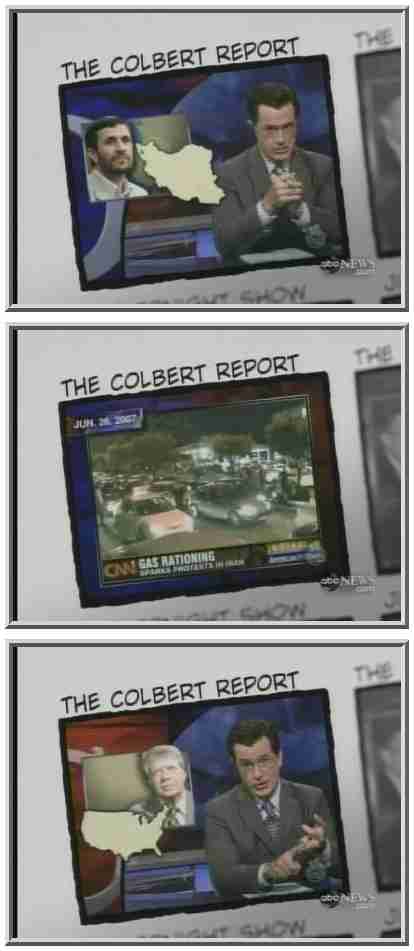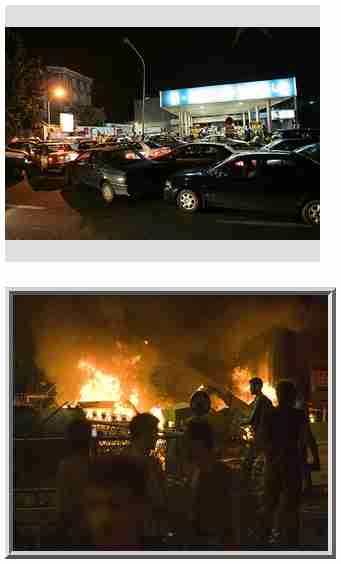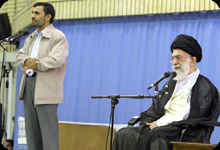
Dynamics

|
Generational Dynamics |
| Forecasting America's Destiny ... and the World's | |
| HOME WEB LOG COUNTRY WIKI COMMENT FORUM DOWNLOADS ABOUT | |
Gas rationing and restrictions on women are infuriating the college-age generation.
 |
On The Colbert Report this week, comedian Stephen Colbert described the current situation in Iran as follows:
Iran today is at the beginning of its generational Awakening era, America under the Carter administration was in the last half of its generational Awakening era, so it's no surprise at all that there are similarities.
In fact, President Mahmoud Ahmadinejad has pursued such heavy-handed policies in the areas of the economy and individual civil rights, that a major generational backlash is rising even more quickly than it did in America under the administrations of Presidents John Kennedy and Lyndon Johnson.
 |
People's anger spilled over into violence on Tuesday evening when Iran suddenly announced gas rationing regulations, just hours before they were to go into effect. Lines at some gas stations were almost a mile long, filled by motorists anxious to get their last full tank of gas before rationing took effect at midnight, limiting them to less than a gallon a day.
A dozen Tehran gas stations were trashed and set on fire this week, accompanied by chants lampooning President Ahmadinejad, who had come into office promising to end poverty and improve the economy.
Instead, Iran's economy has been getting steadily worse. Many young people blame Ahmadinejad for spending huge amounts of money on his misadventures in supporting Hizbollah in Lebanon and Hamas in Gaza, and ignoring domestic needs. And it hasn't been lost on people that Iran is the world's second largest oil producer, and so should be able to supply its own people with gasoline. (However, Iran has limited refining capabilities, so exports oil but imports gasoline.)
The economic problems might not cause so much conflict if it weren't for Ahmadinejad's heavy-handed approach to social issues, especially towards college students, women, the press and labor unions -- groups normally associated with support for individual civil rights.
In fact, Iran is in the midst of what is being called the most ferocious crackdowns on dissent in years.
To the outside world, the most visible sign of this crackdown is Iran's jailing of 150,000 ordinary women wearing loose headscarves, loose coats, or trousers, though most were released quickly to their parents or husbands. These jailings have increased as the warmer spring weather has led to more revealing clothing.
And last month, Ahmadinejad canceled at the last minute a major international women's soccer game in Berlin between German and Iranian teams. The women were to be wearing specially designed headscarves, and only women fans were to be permitted into the stadium, but the game was cancelled nonetheless.
Ahmadinejad has managed to do something so awful that every man who hears of it must be cringing: He's managed to get almost every young woman in Iran pissed off at him.
Ever since the ultraconservative Mahmoud Ahmadinejad became President of Iran in 2005, I've been writing that he should expect a great deal of political turmoil and opposition from college-aged kids, especially from women. This happens to every country entering a generational Awakening era, as Iran is, just one generation past the bloody Iran/Iraq crisis war.
But I didn't expect this. Ahmnadinejad seems to be taking every step possible to infuriate the younger generation, as if he were a bullfighter using his red cape to do everything possible to get the bull to gore him.
Other recent oppressive steps taken by the Iranian government include:
Although this seems to be crazy stuff, it actually makes perfect sense from the point of view of Generational Dynamics: Iran's leaders are attempting to relive the heady days of their youth, in the crisis war of the 1980s.
The current crackdown appears to have begun following a 21-March-2007 speech by Ayatollah Sayed Ali Khamenei, the recognized leader of the Islamic Revolution that began in 1979.
He called the new Iranian year "the year of national unity and Islamic harmony," and said:
[The enemy challenges Iran through] sowing discord by demoting the Iranian national unity [and] inciting economic problems to slow down the country's progress. ...
[He cautioned about enemy's psychological warfare and vicious efforts to stir up differences between the Iranian people and the world of Islam.]
Under the pretext of sectarian feelings, religious inclinations and gild orientations, the enemies are bent on destroying unity of the Iranian nation or fan religious differences in the world of Islam and draw a wedge between the Iranian nation and the rest of the Islamic community by inciting war between Shiites and Sunnis.
[He affirmed that the sole way to frustrate enemies and thwart their plots lies in efforts to unite the nation and promote its integrity.]
In God's assistance, all people of every sect or religion will expedite their hopeful move towards their bright future. ... At the same time all Muslim nations will demonstrate their unity by promoting Islamic solidarity and fraternity."
What's interesting about this speech is how backward-looking it is. This isn't surprising, as old folks frequently want to relive their youth. In fact, as I've written many many times on this web site, today's Boomers in America are similarly trying relive the excitement and eroticism of their own youth in the 1960s. In the case of Khamanei, we see a different angle on this: An old person reliving a previous crisis war.
 |
Yesterday (Saturday), Khamenei appeared on Iranian TV with a new speech, praising Ahmadinejad for upholding the values of the Islamic Revolution, as he had demanded in his March speech.
Khamenei pointed to Ahmadinejad's "dauntless steps" and "perserverance" in the political and economic arena, and for upholding the values of the Islamic revolution.
The petrol rationing scheme is one of the dauntless moves made by the government which is to be continued by the officials."
These two speeches attempted to re-capture every symbol of the Iranian Revolution of 1979 and the Iran/Iraq war of these 1980s in the face of mounting political opposition:
Readers may recall that on several occasions I've expressed puzzlement about Iran's foreign policy since Ahmadinejad became President.
The reason for my confusion was that Ahmadinejad's policies were contradictory to the will of the people, especially the young people. For example, young Iranians don't approve of Americans in Iraq, but they are pro-American on cultural and social issues. Iranians want to develop nuclear technology, but they don't like to see Ahmadinejad sticking his thumb in the eye of the world, possibly provoking an attack on Iran's nuclear facility. So what is Ahmadinejad up to?
From the point of view of Generational Dynamics, a country's direction is determined by the attitudes and behaviors of large masses of people, entire generations. The behaviors of politicians aren't important except insofar as they reflect the will of the people.
So it was puzzling to me why Ahmadinejad was acting like a madman in international affairs -- threatening to wipe Israel off the map, denying the Holocaust, threatening weapons-grade plutonium development, and so forth. These things have infuriated the international community, they are not popular with the Iranian people, and they've been puzzling to me.
But finally things are falling into place. Ahmadinejad's policies are finally beginning to make sense, thanks to the current situation and Khameini's speeches.
All of Ahmadinejad's madman foreign policy actions are tied to exactly the same objective -- preserving national unity, renewing the spirit and ideology of the Islamic Revolution.
By provoking the West -- especially Western analysts and journalists -- into making direct or indirect invasion and bombing threats against Iran, Ahmadinejad is pursuing the same strategy that Khameini follows in warning of an American invasion -- he hopes to frighten young people into returning to the sense of national unity.
This is a very bizarre strategy of course. It's almost a desperate strategy. But it's consistent with the overriding objective -- the same objective that Presidents Kennedy, Johnson and Nixon had in the 1960s -- to restore national unity. The fact that the strategy is getting him into trouble, as the American's Presidents' strategies got them into trouble, is what always happens during a generational Awakening era.
Ahmadinejad is going farther than just words, of course. He's supplying weapons to terrorists in Iraq, Hizbollah in Lebanon, and Hamas in Gaza. He's playing the game "Let's you and him fight," referring to a psychological and social game described by Eric Berne in his book, Games People Play. I previously described how this game was played in the late 1980s in the lead-up to the Darfur war. It's actually not a rare game in international politics.
Ahmadinejad's game is very dangerous and very desperate. Presumably he wants to provoke a THREAT of war, but doesn't want to provoke an actual war, though we can't be sure of that, given his desperation. And even if provoking actual war is not his intention, he may certainly miscalculate, with unpredictable results.
His desperation is increasing with the reality that his policies are not working with the Iranian people, and cannot work; instead of unifying them, his policies are turning them against him. Khameini's speech on Saturday congratulating Ahmadinejad for his "dauntless steps," his "perserverance," and for upholding the values of the Islamic revolution will not convince anybody, and would be subject of much mockery in the college press if it weren't for the fact that such mocking would be severely punished.
From the point of view of Generational Dynamics, Iran is a dangerous wild card. If it were an isolated country, then I would say that this political conflict would go on for a few years, and eventually Khameini and Ahmadinejad would have to back off. The kids are bound to win this fight against their parents. There might even be a "velvet coup" peaceful change of government.
But Iran is not an isolated country; it's a country situated in the
most volatile region of the world, with a desperate policy of
provoking war threats all around it. How far this will go remains to
be seen.
(2-Jul-07)
Permanent Link
Receive daily World View columns by e-mail
Donate to Generational Dynamics via PayPal
Web Log Summary - 2016
Web Log Summary - 2015
Web Log Summary - 2014
Web Log Summary - 2013
Web Log Summary - 2012
Web Log Summary - 2011
Web Log Summary - 2010
Web Log Summary - 2009
Web Log Summary - 2008
Web Log Summary - 2007
Web Log Summary - 2006
Web Log Summary - 2005
Web Log Summary - 2004
Web Log - December, 2016
Web Log - November, 2016
Web Log - October, 2016
Web Log - September, 2016
Web Log - August, 2016
Web Log - July, 2016
Web Log - June, 2016
Web Log - May, 2016
Web Log - April, 2016
Web Log - March, 2016
Web Log - February, 2016
Web Log - January, 2016
Web Log - December, 2015
Web Log - November, 2015
Web Log - October, 2015
Web Log - September, 2015
Web Log - August, 2015
Web Log - July, 2015
Web Log - June, 2015
Web Log - May, 2015
Web Log - April, 2015
Web Log - March, 2015
Web Log - February, 2015
Web Log - January, 2015
Web Log - December, 2014
Web Log - November, 2014
Web Log - October, 2014
Web Log - September, 2014
Web Log - August, 2014
Web Log - July, 2014
Web Log - June, 2014
Web Log - May, 2014
Web Log - April, 2014
Web Log - March, 2014
Web Log - February, 2014
Web Log - January, 2014
Web Log - December, 2013
Web Log - November, 2013
Web Log - October, 2013
Web Log - September, 2013
Web Log - August, 2013
Web Log - July, 2013
Web Log - June, 2013
Web Log - May, 2013
Web Log - April, 2013
Web Log - March, 2013
Web Log - February, 2013
Web Log - January, 2013
Web Log - December, 2012
Web Log - November, 2012
Web Log - October, 2012
Web Log - September, 2012
Web Log - August, 2012
Web Log - July, 2012
Web Log - June, 2012
Web Log - May, 2012
Web Log - April, 2012
Web Log - March, 2012
Web Log - February, 2012
Web Log - January, 2012
Web Log - December, 2011
Web Log - November, 2011
Web Log - October, 2011
Web Log - September, 2011
Web Log - August, 2011
Web Log - July, 2011
Web Log - June, 2011
Web Log - May, 2011
Web Log - April, 2011
Web Log - March, 2011
Web Log - February, 2011
Web Log - January, 2011
Web Log - December, 2010
Web Log - November, 2010
Web Log - October, 2010
Web Log - September, 2010
Web Log - August, 2010
Web Log - July, 2010
Web Log - June, 2010
Web Log - May, 2010
Web Log - April, 2010
Web Log - March, 2010
Web Log - February, 2010
Web Log - January, 2010
Web Log - December, 2009
Web Log - November, 2009
Web Log - October, 2009
Web Log - September, 2009
Web Log - August, 2009
Web Log - July, 2009
Web Log - June, 2009
Web Log - May, 2009
Web Log - April, 2009
Web Log - March, 2009
Web Log - February, 2009
Web Log - January, 2009
Web Log - December, 2008
Web Log - November, 2008
Web Log - October, 2008
Web Log - September, 2008
Web Log - August, 2008
Web Log - July, 2008
Web Log - June, 2008
Web Log - May, 2008
Web Log - April, 2008
Web Log - March, 2008
Web Log - February, 2008
Web Log - January, 2008
Web Log - December, 2007
Web Log - November, 2007
Web Log - October, 2007
Web Log - September, 2007
Web Log - August, 2007
Web Log - July, 2007
Web Log - June, 2007
Web Log - May, 2007
Web Log - April, 2007
Web Log - March, 2007
Web Log - February, 2007
Web Log - January, 2007
Web Log - December, 2006
Web Log - November, 2006
Web Log - October, 2006
Web Log - September, 2006
Web Log - August, 2006
Web Log - July, 2006
Web Log - June, 2006
Web Log - May, 2006
Web Log - April, 2006
Web Log - March, 2006
Web Log - February, 2006
Web Log - January, 2006
Web Log - December, 2005
Web Log - November, 2005
Web Log - October, 2005
Web Log - September, 2005
Web Log - August, 2005
Web Log - July, 2005
Web Log - June, 2005
Web Log - May, 2005
Web Log - April, 2005
Web Log - March, 2005
Web Log - February, 2005
Web Log - January, 2005
Web Log - December, 2004
Web Log - November, 2004
Web Log - October, 2004
Web Log - September, 2004
Web Log - August, 2004
Web Log - July, 2004
Web Log - June, 2004